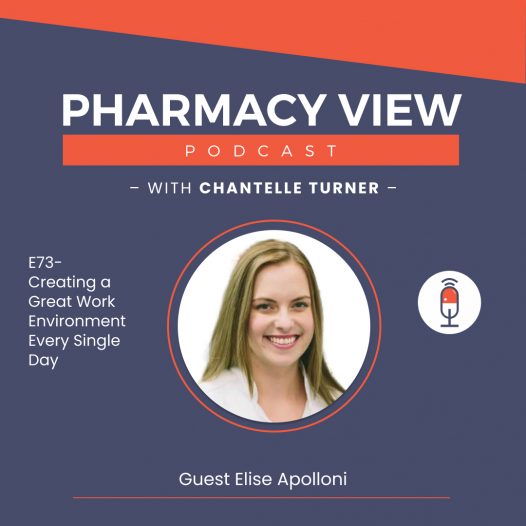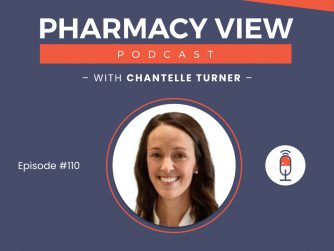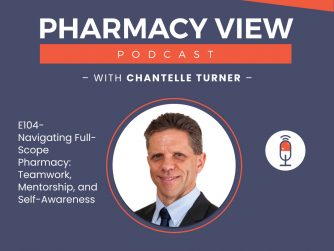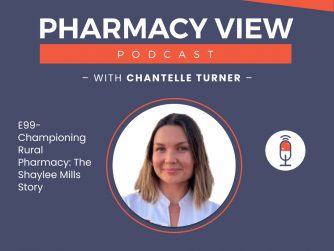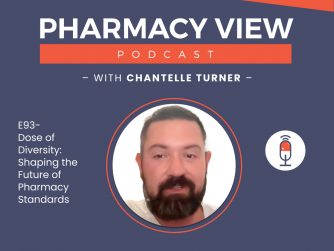In the first episode of Pharmacy View Podcast’s Full Scope Pharmacy Leadership stream, host Chantelle Turner, a Pharmacist Leadership and Business Coach at TURN Pharmacy Leadership is joined by Elise Apolloni, Pharmacist and Co-Owner, Capital Chemist Wanniassa. Elise was also the Telstra Young Business Woman of the Year in 2017. Listen to this episode if you want to understand what it means to be the Owner of a Community Pharmacy as someone who wants to impact the physical and mental health of the community positively and also to understand how empathic care and awareness are vital in realizing that dream.
Elise started their Pharmacy journey at the age of 14 when nudged in the direction by their Career Counselor; they begrudgingly went and worked for a week at their local Capital Chemist. The rest as they say is history as this year Elise completes 20 years of working in the Capital Chemist Group. Elise talks about how they always wanted to own a Community Pharmacy because they found it to be a lovely and respectful way to spend their time while also making a real difference in the lives of community people.
When asked about taking up a leadership role in Pharmacy, Elise emphasizes how they remember watching a former colleague owning a Pharmacy and that position allowing them to create an environment where people would want to work. At that point in time, Elise imagined owning a Pharmacy one day and creating an environment or an ecosystem that Pharmacists would love going into and that community people would like coming into as well. Also, they add how being an owner allows you to implement things the way you want them done.
Furthering on the leadership role at the Pharmacy, Elise talks about being aware of the enormous responsibility they shoulder when it comes to early career Pharmacists and Pharmacy interns. These people entrust the most critical year of their Pharmacy career to the mentor, so Elise doesn’t take this lightly. Elise then talks about how Community Pharmacies are places people often visit on their worst day. Emphatic care and awareness are essential for Pharmacists and patients that walk into the Pharmacy.
To Elise, healthcare services are more than just treating health ailments. They are also about being able to provide preventive services. Having had lost a 16-year-old colleague to suicide in 2015, Elise’s passion for mental health only intensified. Because being a Pharmacist is primarily about working with people who are often on their worst day or worst month, Elise wants to bring a smile to the faces of those having a tough time. They talk about how being able to look outward can come in handy in this regard.
Supporting young Pharmacists to realize their full potential to help positively impact people’s lives stands at the core of Elise’s work. They want to do all they can and believe that trusting young entrants to the team and delegating responsibilities to them, provided they are given the right training and skill, can make the much-needed impact in bettering community health. And their favorite tool—empathy, of course! Empathy for the patients and empathy for the staff is needed. Only by seeing their real needs can the right help and service be given.
Topics Covered
- Elise’s start in the Pharmaceutical Industry
- Dream of owning a Community Pharmacy
- Value of being in a leadership role
- Role of mentoring for early career Pharmacists
- Becoming a good leader
- Trust your teammates and delegate
- Advice for career managers
- Challenges for Pharmacists and how to overcome them
- Empathy is the most important tool in a Pharmacist’s toolbox
Key Quotes (Time Stamps)
- “I wanted to work at the local video store because my family watched lots of videos and I thought that would be a good place to get a high school job. And the Careers Council lady was like, ‘Oh, you know, you’re doing good and you like science, you like biology. Why don’t you go to a medical center or go to a pharmacy?’ I, almost begrudgingly, went and spoke to my local Capital Chemists and did a week there and then subsequently worked there. And then the rest is history. So, I’ve now worked in the Capital Chemist Group for 20 years this year.” (2:39 – 3:16)
- “I always thought, from even when I was at Uni and I was talking to my mates, I was always like, I would like to own a Community Pharmacy one day. And it was just around that family vibe, picking your people and making sure that it’s a lovely, supportive health environment. And it was just so clear to me in my upbringing that it was just such a lovely, respectful way to spend your time and that you made a real difference in people’s lives. So, the difference in people’s lives. So that seemed like a good way to spend my day.” (4:11 – 4:44)
- “I remember watching how being in that position allowed you to create the environment you wanted to work in. I think a lot of people go to work, and for whatever reason they don’t enjoy it or something happens at work, and it annoys them when that happens. And I just thought, gosh, imagine being able to create an environment or an ecosystem that you love going into and that, in return, hopefully, other people like to come into as well.” (6:06 – 6:35)
- “I think that role also allows you to implement things the way you want them done. So, if you want to roll out an asthma education service, you can; you need to work out how to do it. You need to make a plan and get educated and then make sure you’re appropriately qualified. But I loved that kind of capacity to have a grassroots impact the way your community specifically needed it. And that’s what sort of made it quite an attractive opportunity for me to want to pursue as I became registered.” (6:43 – 7:17)
- “I think I do the absolute best I can, and I think it’s a huge responsibility. Someone’s entrusting you with the most critical year of their Pharmacy career when you build the foundation for what the rest of their career could, potentially, look like. So, it’s a huge undertaking, and I don’t take it lightly.” (9:27 – 9:50)
- “We often help people that aren’t coming in on their best day. And so, managing various interactions and making sure that people are looking after themselves, that they can look after others. I think they are sort of the baseline, that empathic care and awareness and of that special place that we hold in the health care system and making sure that people respect that and also able to be in an environment where they can deliver that is really important to me.” (10:36 – 11:05)
- “Another really critical time was in 2015. So, that was a couple of years after I became a Pharmacy owner. We lost a team member here and a colleague, and it was hard. That was an extremely pivotal time in my journey personally and professionally in that it made me look a lot more closely outwardly at what was going on with our team and wanting so desperately to upskill, to understand how I could prevent that from happening in the future or recognize things that I could assist with in the future.” (14:49 – 15:26)
- “I feel very fiercely protective of our team and the people that choose to spend their days serving others in our Pharmacy. And so, I think that’s a good way to spend my time, making sure that they have what they need to do their job properly and make sure they make that same impact.” (16:11 – 16:32)
- “We often have things that we like done a particular way. So that’s why we don’t tend to delegate because we always have this fear that the next person won’t do it as well as we could. So, I think part of that is actually our problem in that we need to make sure when we’re training or coaching or trying to impart knowledge that we do it in a way that we are comfortable with so that it’s not a fearful thing to delegate, that you do it in such a way that you feel confident, that you provided good instruction or a clear training or clear coaching, supportive environment so that people can flourish. But also, when they make a mistake, you can help them with that. And that they’re going to tell you if they make a mistake and not try and patch it up. Creating that dual environment of it’s okay to ask for help, but also, I’m going to give you great training to make so that you can actually achieve what we hope you can.” (22:00 – 22:58)
- “You learn that the more you give to others, the more empowered they feel, but it also gives you more time to do more stuff. And so, you can think about things differently, and you don’t feel as much pressure because there are other people in the universe that can do things if you can’t.” (23:12 – 23:28)
- “We don’t always see people on a great day, on their best day. And people often come with a need. And I think having that empathy and being able to get to the bottom of what that need is important. What makes my Pharmacy such a great environment is we have that communication skill, that connection with the person but also the capacity and the training, hopefully, to the bottom of how we can do the most we can for their health care.” (28:53 – 29:21)
- “There are lots of things that you can teach or that you can like just pick up over time. You can learn how to write a strategic plan or a business plan, and you can learn how to have tough conversations with people. You can learn lines and structure around that and practice the words and practice different techniques and what have you to interview people and all those sorts of things. But, innate empathy, compassion, or what have you—that takes time, life experience, patience, and recognition of when you have a bias or when maybe when you’re not practicing empathy when you aren’t kind of flipping the coin and thinking about the other side. So, I think that’s an important skill.” (29:28 – 30:15)
Social Media Clips (Time Stamps)
- Elise’s start as a Reluctant Pharmacist (1:57 – 4:10)
- Elise always wanted to own a Community Pharmacy (4:11 – 4:44)
- Be the leader you need others to be for you (5:19 – 7:17)
- Elise knows what a huge responsibility mentoring is (8:32 – 11:47)
- Helping those who are often on their worst day, worst month (12:06 – 17:05)
- Become an empowering leader (17:12 – 19:22)
- Trust and empower people (19:24 – 21:35)
- Advice for career managers (21:38 – 24:34)
- How to overcome challenges (24:36 – 27:05)
- Empathy is the most important tool (27:57 – 30:15)
Useful Links
Capital Chemist Wanniassa | Website
Capital Chemist Wanniassa | Instagram
Capital Chemist Wanniassa | Blog
Capital Chemist Wanniassa | YouTube
Email: eliseapolloni@capitalchemist.com.au
Turn Pharmacy Leadership | LinkedIn
Turn Pharmacy Leadership | Website
Email: cs.turner@bigpond.com
Attain Pty Ltd – Home (iattain.com.au)
Scott Carpenter, EVBC | LinkedIn
Shopfront Solutions: Overview | LinkedIn
Aerion Technologies: Overview | LinkedIn
Aerion Technologies | Helping Non-Techs Build Better Tech
Pharmacy View Podcast: Overview | LinkedIn
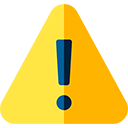
Disclaimer: The following episode of our podcast covers a sensitive topic of suicide. We understand that suicide is a deeply distressing and serious matter that can profoundly impact individuals and communities. It is important to note that the views expressed by our guest(s) are their own and do not necessarily reflect the opinions of our podcast or our company.
While we strive to provide valuable and informative content, we recognize that discussing topics related to mental health, including suicide, can be triggering or uncomfortable for some listeners. We strongly advise discretion and self-care when engaging with this episode. If you or someone you know is struggling with thoughts of self-harm or suicide, we urge you to seek professional help or contact a helpline in your country.
This episode is intended for educational and informational purposes only. It is not a substitute for professional medical or mental health advice, diagnosis, or treatment. If you have any concerns about your mental health or someone else’s mental health, we encourage you to consult with a qualified healthcare professional.
We understand the importance of providing our listeners with a safe and supportive environment. Suppose you feel distressed or overwhelmed during or after listening to this episode. In that case, we would like to encourage you to take the necessary steps to prioritize your well-being, such as speaking with a mental health professional or confiding in a trusted person in your life.
Remember, you are not alone, and there are people who care and want to help.


